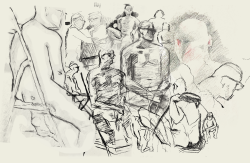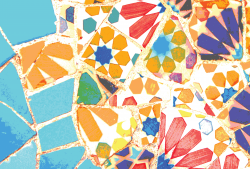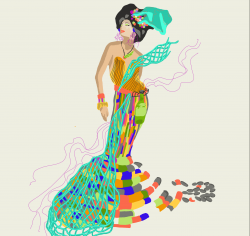Madvillainy, Madvillain, 2004
Madvillainy is an indie rap fan’s wet dream: an album-length collaboration between MF DOOM, the masked oddball who fancies himself a super-villain, and producer Madlib, renowned for his retro-futuristic soundscapes. The result is somehow greater than the sum of its titanic parts—just under an hour of skittering, stoned delirium, a barrage of witty and bizarre punch-lines punctuated only by the occasional instrumental break or cartoon voice sample.
Almost every line DOOM spits is quotable. His previous work was poorly recorded, unintentionally lo-fi, but here it sounds more expressive than ever. His flows are limber and varied, his lines loaded with assonance, and he’s constantly big-upping himself in the third person: on “Meat Grinder,” he’s “a hopeless romancer with the dopest flow stanzas,” or, on “Figaro,” “the clever nerd/the best emcee with no chain you ever heard.” Madlib, for his part, provides an equally virtuosic performance with his production, flipping everything from jazz standards to neo-soul into a woozy, schizophrenic redux of classic boom bap. Madvillainy is sprawling but aesthetically cohesive, begging repeated listens but immediately engaging. Funny, oddly poignant, and bursting with its own unique energy, the album is a masterpiece that solidifies both men’s places in the hip-hop canon.
— Sean Quigley
Illinois, Sufjan Stevens, 2005
Who besides Sufjan Stevens could write a catchy, hauntingly beautiful tune about a serial killer? “John Wayne Gacy, Jr.,” the ethereal (but also night terror-inducing) song about Chicago’s “Killer Clown,” is just one of the many brilliantly orchestrated pieces composed by Stevens on Illinois. The album pairs literary lyrics rife with historical and pop culture references to Illinois with whimsical instrumentation to create 73 minutes of pure indie-folk bliss. Stevens’ significant musical talents are on full display in this homage to the Land of Lincoln. Over four years later, we still await the next state, making it less and less likely that all 50 will get the same treatment. If only they all could.
—Miykaelah Sinclair
Drums Not Dead, Liars, 2006
I’ll never forget the moment I first heard the drums hit in “Be Quiet Mt. Heart Attack,” the same moment I realized there would be no angular guitars or bouncy bass lines, the very moment “post-punk revival” was pronounced dead. Liars threw down the gauntlet with Drum’s Not Dead—it’s 45 minutes of dense tribal experimentalism leading up to the five most relieving minutes this decade. (Seriously, don’t listen to “Other Side of Mt. Heart Attack” until you’ve got all the way through the album—it’s just not the same.) Half their fans would have rather heard more of their spastic brand of dance-punk, but Liars was just too progressive to be held back.
—Matt Collins
Ys, Joanna Newsom, 2006
When I was a freshman, I wrote a review for Joanna Newsom’s Ys that a certain senior I looked up to called “unprofessional.” Here’s my ridiculous opening sentence: “It is difficult to write a review, in the conventional sense of the word, of Joanna Newsom’s Ys, because it’s unlike any other record you’ll hear this year, this decade, or perhaps even in your life.”
Three years later, that sounds about right. Newsom’s harp skills and Van Dyke Parks’s orchestral flourishes work perfectly together. Ys’ five dense orchestral pieces are stunningly composed and full of surprises. Time hasn’t made it any more accessible, but Ys remains one of the most rewarding albums of the decade.
—Justin Hunter Scott
Turn on the Bright Lights, Interpol, 2002
After a slew of EPs, Interpol found its own sound in 2002 with Turn on the Bright Lights. Between the lulling opening track, “Untitled,” and the emotional closer, “Leif Erikson,” Interpol plays nine other other namedrop-worthy tracks that give Turn on the Bright Lights a rich re-playability. Call it post-punk revival. Call it New York City fashion. Or remark on the band’s steady decline in songwriting ability. Regardless, Turn on the Bright Lights is fifty minutes of consistently brilliant songwriting wrapped in an atmospheric package with a post-punk ouevre that hasn’t been seen since the genre first emerged.
—James McGrory
Apologies to the Queen Mary, Wolf Parade, 2005
“Give me your eyes/I need the sunshine.” It’s probably the most memorable line on Apologies to the Queen Mary, but it’s also one of its most disposable. As with any anthemic pop song, there’s only so many times you can sing “And nobody gives a damn!” at the top of your lungs before you wonder if it’s really worth singing that loudly.
But that’s when Apologies actually starts grow on you—not with “This Heart’s on Fire,” but with “Modern World” and “Dinner Bells” and “You Are A Runner.” In short, Boeckner, Krug, and Co. buried their best hooks somewhere between the big synth lines and crass yelps. It’s your job to find them.
—Dan Cook





Illnoise.